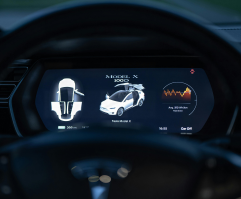
—
A Tesla odometer lawsuit alleges vehicle owners in California are ripped off because the odometers indicate greater distances than what the vehicles travel.
The Tesla odometer class action lawsuit includes, “all citizens residing in California who purchased a new or used Tesla Vehicle for personal, family, or household purposes.”
The lawsuit was filed by Nyree Hinton who purchased a used 2020 Tesla Model Y in December 2022 when the odometer indicated 36,772 miles. The plaintiff complains Tesla knowingly overstates the distances traveled in Tesla vehicles or the automaker tolerates “substantial inaccuracy” in distances traveled.
According to the class action, Tesla uses an odometer system with “predictive algorithms, energy consumption metrics, and driver behavior multipliers that manipulate and misrepresent the actual mileage.”
By doing this Tesla allegedly avoids warranty repairs and causes depreciation of the value of Tesla vehicles. Claiming Tesla engages in fraudulent business practices, the plaintiff asserts the odometer inaccuracies are designed to benefit Tesla at the expense of customers.
“By tying warranty limits and lease mileage caps to inflated ‘odometer’ readings, Tesla increases repair revenue, reduces warranty obligations, and compels consumers to purchase extended warranties prematurely.” — Tesla odometer lawsuit
The plaintiff contends Tesla previously provided unlimited mileage warranties for the battery and drive unit. But Tesla warranties now have mileage limits to determine coverage. In addition, the plaintiff complains anything that goes wrong outside of the warranty period will likely result in Tesla customers paying their own money for repairs.
The Tesla odometer lawsuit alleges the system patent explicitly describes a “miles-to-electrical energy conversion factor” that “varies dynamically based on road and traffic conditions.”
According to the Tesla odometer lawsuit:
“Tesla applies a lower efficiency multiplier to ‘aggressive’ driving behaviors, such as rapid acceleration or high-speed driving, thereby inflating the recorded mileage relative to the energy consumed. Conversely, ‘efficient’ driving behaviors receive higher efficiency multipliers, reducing the recorded mileage for similar energy usage.”
The mileage traveled is supposedly inflated by varying percentages ranging from 15% to 117% higher than the plaintiff’s other vehicles and allegedly many times greater than the four percent industry standard tolerance for measures of inaccuracy in odometers under normal conditions.
Calling it a “scheme,” the odometer lawsuit says Tesla avoids the manufacturing costs of installing odometers in their vehicles that accurately record the mileage driven. The plaintiff also complains the resale value of a Tesla vehicle will continue to be diminished.
The Tesla odometer lawsuit was filed in the U.S. District Court for the Central District of California: Nyree Hinton v. Tesla, Inc., et al.
The plaintiff is represented by Singleton Schreiber, LLP.

